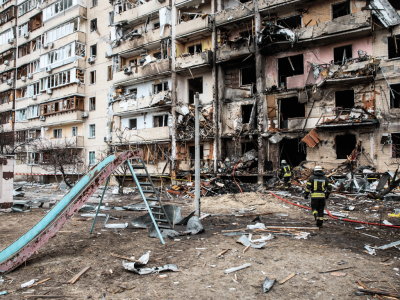
EXECUTIVE SUMMARY
One of the consequences of the Russian full-scale aggression against Ukraine was, among others, the mass migration of the war refugees to Poland. As a result, Poland's long-term process of becoming a binational state has significantly accelerated. About 5 per cent of the inhabitants in Poland already belong to the Ukrainian diaspora, while this percentage is as high as 10 per cent in larger cities. At the same time, the war context has made the objective difficulties and problems associated with such a large and sudden migration a perfect platform for actors whose goal is to stir up resentment against the Ukrainians – including the Russian Federation. One of the most important areas of such activity is social media.
The report aims to describe the anti-Ukrainian hate speech appearing in Polish social media after the Russian invasion of Ukraine on February 24, 2022. The analysis includes data primarily from Twitter. The report identifies the dominant hateful narratives, their spread patterns, the dynamics of the process, and changes over time. The study includes material from February 23, 2022, to January 1, 2023.
The research of organizations dealing with the topic leads us to the thesis that Twitter is the medium where key hateful content appears; narratives, and specific language clusters are formed, which then "spread" to other media. At the same time, Twitter is the only platform from which published content can be legally and easily downloaded for further analysis.
Based on the available data, it is difficult to measure the exact scale of anti-Ukrainian hate speech on Polish Twitter. In all likelihood, anti-Ukrainian content is present in tens of thousands of posts. CounterHate system identified 90,019 posts potentially containing hateful narratives directed against Ukrainians.
The periods of the highest intensification of anti-Ukrainian hate speech on the Polish Internet turned out to be:
- May 2022 – the increase was the result of a high-profile murder that occurred on Nowy Świat Street in Warsaw. Parts of the public opinion began to accuse an unidentified Ukrainian citizen of committing it. The claim was later denied by the Ministry of Justice and in January 2023, the police arrested one of the three perpetrators (all of them Poles);
- August 2022 – Mass popularization of the hashtag #StopUkrainizacjiPolski (#StopUkrainizationofPoland) over several days;
- November 2022 – Intensification of hateful narratives related to the accidental explosion of a rocket fired by the Ukrainian defense forces, which occurred in Przewodowo, close to the Eastern border of Poland..
The accounts of opinion leaders with many followers also turn out to be very important in spreading resentment and xenophobia. Among them, the following groups turned out to be the most important in the research conducted:
- far-right politicians;
- leaders and activists of radical political movements;
- extremist publicists;
- some online-based activists.
A critical form of spreading hate speech on social media remains the activity of inauthentic accounts (bots) – some of which belong to a network of accounts that duplicate Russian propaganda. They publish posts on a massive scale (dozens or even hundreds per day) so that with their actions they can quickly create strong trends. A good example is the mass popularization of the hashtag #StopUkrainizacjiPolski (#StopUkrainizationofPoland).
The most popular anti-Ukrainian narratives relate to the pre-existing resentment and negative emotions present in Polish society – founded on complex historical relations or insecurities regarding material condition:
- Hate speech against Ukrainians abundantly draws on difficult historical relations, contributing to propagating the stereotype of the Ukrainian as a "Polish eater," an extreme nationalist who hates Poles. The narratives refer primarily to first half of the 20th century, specifically, the activities of Stepan Bandera, the Organization of Ukrainian Nationalists (OUN), and the Ukrainian Insurgent Army (UPA). At the same time, these themes seem to be more present on the internet than in offline reality. The activity of Russian propaganda can explain this disproportion, focused precisely on social media channells, for which the reinforcement of tensions arising around the complex history of Polish-Ukrainian relations is a strategy of action recognized at least since 2013. Besides, the popularity of this trend may contribute to the sense of anonymity and detachment of statements from specific audiences that the internet provides.
- Economic threads proved to be of a great importance in building negative sentiment. Thus, on one hand, there appeared statements critical of the Polish authorities, who were said to be overly "privileging" war refugees, becoming dependent on Ukrainian influence. On the other hand, Ukrainians arriving in Poland were accused of misusing their own situations to exploit Poland – often through references to unverifiable urban legends heard "from a hairdresser" or "from a weeping cousin."
Anti-Ukrainian content is part of a trend of narratives characteristic for the contemporary alt-right "grand replacement theory" circles, which build resentment against national, ethnic, and racial minorities.
An example of such convergence is the word "Ukrainization," – serving as a keyword substantial for the majority of the anti-Ukrainian narratives. It is understood in many ways: as an economic domination, an advantage in access to social benefits, or even "invasion" in the symbolic dimension. Moreover, it is sometimes used to suggest the theory of a transformation in Poland's ethnic structure – or, as the proponents of thetheory would call it, its "substitution." In their view, the settlement of Ukrainians in Poland would marginalize the Polish population, disrupting its majority domination.
The effectiveness and sustainability of this "spiral of hate" are difficult to determine – much depends on the scale and the nature of the phenomenon, the entrenchment of current opinions and attitudes, and the resilience of the society to hateful narratives and disinformation. However, it is arguable that online hate speech is not a socially and politically indifferent phenomenon, both from the viewpoint of its victims and society as a whole. Taking a broader perspective, historical experience and existing research clearly show that hate speech leads to stigmatization, discrimination, and violence, often on a large scale. The presence of anti-Ukrainian narratives online promotes the taming of hate speech, naturalization, and desensitization to hateful narratives, which may have a more significant impact in the long term. It is worth noting that the public intensification of sympathy and support for embattled Ukraine is still ongoing. Consequently, some people in Poland may still be holding back their anti-Ukrainian resentment, now deeply hidden but constantly reinforced by the online hate speech. Eventually in a more favorable situation they may explode, once active support for Ukraine and the country's refugees would naturally sink due to the societal exhaustion.
English version of the report will be available soon.


